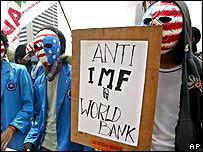Oil Change in Indonesia/Singapore as Controversy Surrounds World Bank Meetings
 Hello from the International People’s Forum on the IMF and World Bank (IPF) on the island of Batam, Indonesia! Batam is a short ferry ride from Singapore, where the World Bank and the International Monetary Fund are in the process of holding their Annual General Meeting. The IPF has brought together hundreds of social and environmental justice activists from around the world to develop strategies to challenge the problems associated with the World Bank and the IMF.
Hello from the International People’s Forum on the IMF and World Bank (IPF) on the island of Batam, Indonesia! Batam is a short ferry ride from Singapore, where the World Bank and the International Monetary Fund are in the process of holding their Annual General Meeting. The IPF has brought together hundreds of social and environmental justice activists from around the world to develop strategies to challenge the problems associated with the World Bank and the IMF.
Oil Change International is in Batam to call attention to the hundreds of millions of dollars a year that the Bank and other international financial institutions are pumping into the coffers of the international oil industry. We want rich countries and international institutions to stop using limited aid budgets to subsidize the expansion of the international oil industry and to start focusing on new renewables and long-term alternatives to the world’s dependence on oil.
This morning I joined representatives from Greenpeace South-East Asia, Jubilee USA Network, Jubilee South, Walhi (Indonesia) and the Bretton Woods Project on a panel to discuss the relationship between debt and oil/climate change. The panel explored ways for activists struggling to avoid dangerous climate change to work together with those campaigning to end the international debt crisis. Oil Change has been working with the Jubilee USA Network and others to draw attention to the fact that rising oil prices are threatening to undermine the benefits of debt cancellation and that the world needs to focus on taking volatile oil prices out of the debt equation once and for all.
In other news, a major controversy has been playing out over the past week as the Singapore government has banned many civil society representatives from attending the World Bank’s Annual Meetings despite the fact that they had been accredited to attend by the institutions themselves. Singapore has been detaining people without cause for hours on end, refusing entry to others for no reason, and generally proceeding in a way that reflects the authoritarian tendencies of the governing regime. In response, more than 160 organizations announced that they would be boycotting the meetings in protest and most civil society organizations have canceled their “dialogue” sessions that were planned to take place during the World Bank’s Annual Meeting.
Today we heard that the Singapore government has agreed to allow 22 of the banned activists to enter the country, but the damage is done. The fact is that the World Bank has been doing business with dictators since its establishment. The history of the World Bank and oil is a perfect example, since the Bank seems to be all too happy to do business with dictators if it means helping expand oil supplies despite the overwhelming evidence that many oil projects exacerbate rather than reduce poverty. The controversy surrounding the Bank’s meetings in Singapore, where virtually all peaceful protest is banned, is only the latest manifestation of this shameful history.
I’m on my way back to Singapore later today to prepare for the release of a report that Oil Change International has produced in cooperation with a range of partner organizations on the World Bank’s new strategy to support “clean energy”. More on this tomorrow.
Graham Saul
